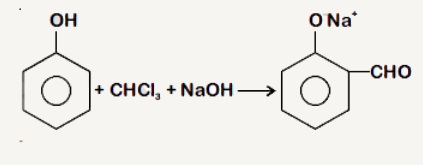The reaction which involves dichlorocarbene as an electrophile is
Reimer-Tiemann reaction
Kolbe's reaction
Friedel-Crafts' acylation
Fittig's reaction
The correct Answer is:C
Topper's Solved these Questions
- ALCOHOLS, PHENOLS AND ETHERSBOOK - MODERN PUBLICATIONCHAPTER - ALCOHOLS, PHENOLS AND ETHERSEXERCISE - OBJECTIVE TYPE QUESTIONS (MULTIPLE CHOICE QUESTIONS) (from competitive examinations) ( JEE (Advance) for IIT Entrance)
7 Videos
- ALCOHOLS, PHENOLS AND ETHERSBOOK - MODERN PUBLICATIONCHAPTER - ALCOHOLS, PHENOLS AND ETHERSEXERCISE - OBJECTIVE TYPE QUESTIONS (MULTIPLE CHOICE QUESTIONS) (with more than one correct answer)
10 Videos
- ALCOHOLS, PHENOLS AND ETHERSBOOK - MODERN PUBLICATIONCHAPTER - ALCOHOLS, PHENOLS AND ETHERSEXERCISE - OBJECTIVE TYPE QUESTIONS (MULTIPLE CHOICE QUESTIONS) (from competitive examinations) (AIPMT, NEET & OTHER STATE BOARD.S MEDICAL ENTRANCE)
23 Videos
- ALDEHYDES ,KETONES AND CARBOXYLIC ACIDSBOOK - MODERN PUBLICATIONCHAPTER - ALDEHYDES ,KETONES AND CARBOXYLIC ACIDSEXERCISE - UNIT PRACTICE TEST
13 Videos
Similar Questions
Knowledge Check
The reaction which involves dichloro carbene as an electrophile is :
AReimer-Timann reactionBKolbe's ReactionCFriedel-Craft's reactionDFitting's reaction.Reaction of ethyl amine with alkaline chloroform leads to the formation of carbylamine reaction. This reaction involves the attack of an electrophile on ethyl amine, the electrophile is
AH3O+BH+CRNH+3D:CCl2In Reimer Tiemann reaction dichlorocarbene acts as
ANucleophileBElectrophileCFree radicalDAll of these
Electrophilic additions reactions proceed in two steps. The first step involves the additions of an electrophile. Name the type of intermediate formed in the first step of the following addition reaction H3C−HC=CH2+H+→?
View SolutionElectrophillic addition reaction proceed in two steps. The first step involves the addition of an electrophile. Name the type of intermediate formed in the first step of the following addition reaction.
H2C−HC=CH2+H+→ ?
View SolutionElectrophilic addition reactions proceed in two steps. The first step involves the addition of an electrophile. Name the type of intermediate formed in the first step of the following addition reaction.
H3C−HC=CH2+H+→?
View SolutionElectrophilic addition reactions proceed in two steps. The first step involves the addition of an electrophile. Name the type of intermediate formed in the first step of the following addition reaction.
H3C−HC=CH2+H+→?
View SolutionElectrophilic additions reactions proceed in two steps. The first step involves the additions of an electrophile. Name the type of intermediate formed in the first step of the following addition reaction H3C−HC=CH2+H+→?
View Solution

